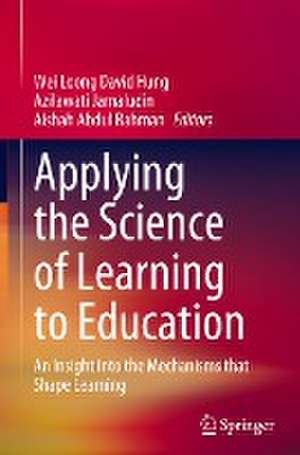Applying the Science of Learning to Education: An Insight into the Mechanisms that Shape Learning
Editat de Wei Loong David Hung, Azilawati Jamaludin, Aishah Abdul Rahmanen Limba Engleză Hardback – 2 ian 2024
Preț: 890.22 lei
Preț vechi: 1085.64 lei
-18% Nou
Puncte Express: 1335
Preț estimativ în valută:
170.49€ • 175.66$ • 142.82£
170.49€ • 175.66$ • 142.82£
Carte tipărită la comandă
Livrare economică 24 februarie-10 martie
Preluare comenzi: 021 569.72.76
Specificații
ISBN-13: 9789819953776
ISBN-10: 9819953774
Pagini: 276
Ilustrații: XIII, 276 p. 36 illus., 18 illus. in color.
Dimensiuni: 155 x 235 mm
Greutate: 0.61 kg
Ediția:1st ed. 2023
Editura: Springer Nature Singapore
Colecția Springer
Locul publicării:Singapore, Singapore
ISBN-10: 9819953774
Pagini: 276
Ilustrații: XIII, 276 p. 36 illus., 18 illus. in color.
Dimensiuni: 155 x 235 mm
Greutate: 0.61 kg
Ediția:1st ed. 2023
Editura: Springer Nature Singapore
Colecția Springer
Locul publicării:Singapore, Singapore
Cuprins
Developments of science of learning in education.- Part 1: Cognition and emotion for learning.- Brain signatures of reading within different types of learners and across written languages: Evidence and implications for education.- The science of mathematics learning: An integrative review of neuroimaging data in developmental dyscalculia.- The neuroscience of emotion and intrinsic motivation.- A strategic mindset for learning and life.- Part 2: Looking beyond the classroom for learning.- Why should reading (books) be preferable to watching (television)?- Optimizing adult guidance to facilitate children’s learning: Recent advances in developmental and computational cognitive sciences.- Physical activity as a tool for enhancing learning.- Nutrition to raise childhood cognition.- Part 3: Translating from laboratories to classroom.- Exploring the possibilities of eye-trackers in education.- Cognitive inhibition in the classroom.- Affordances of computational thinking activities in the development of spatial reasoning.- Bridging the research and policy/practice gap: Making a case for a bi-directional approach, multidisciplinary partnerships to tighten the nexus between science of learning and education.
Notă biografică
Professor David Hung is currently the research Center Director, Science of Learning in Education at the National Institute of Education (NIE), Nanyang Technological University, Singapore. He is also the President's Chair of Education (Learning Sciences) at the Nanyang Technological University. His strong foundations in learning and the learning sciences serve as critical corroborators in contemporary expansive investigations into neuroscience, physiological, and other biological indicators of learning. Prof Hung juxtaposes the science of educational systems with the science of learning.
Asst/Professor Azilawati Jamaludin is Assistant Dean for Science of Learning in Education at the National Institute of Education (NIE), Nanyang Technological University, Singapore. She leads research and develops teaching programs in the areas of Science of Learning, Neurotechnology & Innovation, and Translating Educational Neuroscience, with a focus on application of innovative technologies such as neuroscientific games for at-risk learners. She has been integral in the Science of Learning in Education initiative at NIE, an effort to integrate neuroscientific understanding with education research and practice, with the goal of optimizing learning, as the crux of human potential, for every learner.
Dr Aishah Abdul Rahman is an Education Research Scientist at the National Institute of Education (NIE), Nanyang Technological University, Singapore. Her research examines how children and adolescents regulate their thoughts, attention, actions, and emotions — processes that are referred to as executive functions. Her research utilises both behavioural and neurophysiological methods, and seeks to understand the factors that influence the development of these abilities. Her current research project also investigates potential interventions that can foster these skills in adolescents. In addition to teaching and supervising undergraduate students, she alsoengages with schools and community organisations on raising awareness on ways in which caregivers and educators can nurture these skills in children.
Asst/Professor Azilawati Jamaludin is Assistant Dean for Science of Learning in Education at the National Institute of Education (NIE), Nanyang Technological University, Singapore. She leads research and develops teaching programs in the areas of Science of Learning, Neurotechnology & Innovation, and Translating Educational Neuroscience, with a focus on application of innovative technologies such as neuroscientific games for at-risk learners. She has been integral in the Science of Learning in Education initiative at NIE, an effort to integrate neuroscientific understanding with education research and practice, with the goal of optimizing learning, as the crux of human potential, for every learner.
Dr Aishah Abdul Rahman is an Education Research Scientist at the National Institute of Education (NIE), Nanyang Technological University, Singapore. Her research examines how children and adolescents regulate their thoughts, attention, actions, and emotions — processes that are referred to as executive functions. Her research utilises both behavioural and neurophysiological methods, and seeks to understand the factors that influence the development of these abilities. Her current research project also investigates potential interventions that can foster these skills in adolescents. In addition to teaching and supervising undergraduate students, she alsoengages with schools and community organisations on raising awareness on ways in which caregivers and educators can nurture these skills in children.
Textul de pe ultima copertă
This book provides an overview of the various 'Science of Learning' (SoL) research projects led by researchers at the National Institute of Education, Nanyang Technological University, Singapore, and international research collaborators. It presents the goals and rationale behind the Science of Learning in Education (SoLE) initiative and examines a spectrum of topics relevant to bolstering our understanding of the science underlying learning. The Science of Learning (SoL) is an advancing field, with proponents extolling its potential impact on educational practice. This book investigates the possible correlations or causal relationships between brain functioning and development, physiology, environment factors, and their impact on learning. It promotes an interdisciplinary approach to understanding biological to behavioural mechanisms of learning that are oriented toward optimizing and maximizing every learner’s potential.
Caracteristici
Explores topic 'Science of Learning' and potential for enhancing and shaping future of education practice and research Examines a range of educational research in biological, cultural, and health aspects, and identified issues Presents a collection of 'Science of Learning' research carried out with potential implications for global relevance
